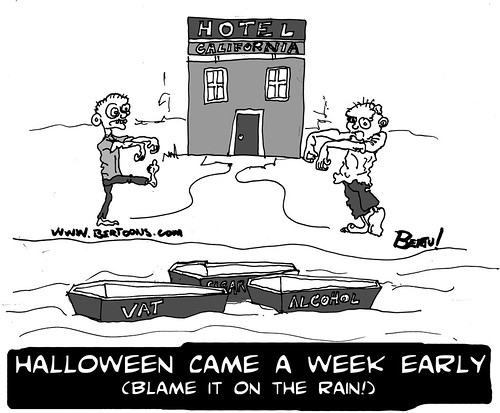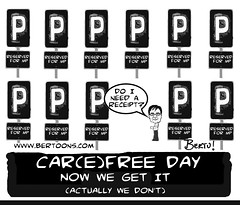In Greek mythology, the river Styx divides this world from the underworld. Charon ferries people across the Styx to the netherworld and very few people return from the bowels of the earth (Orpheus and Dante are some examples of men on whom lady luck smiled). The only other people who return from the land of the dead are those made famous in the sixties horror movies and those enjoying a revival among the deprived youth of today – vampires and zombies. And what better period to talk about the undead, the unliving and the general ‘uns’ than the weekend of Hallowe’en (or All Hallow’s Eve)?
This year Halloween came early. Or at least it seemed to do so from the point of view of us expats basking in the rare Luxembourg sun (admittedly an icicle-inducing zero degrees Celsius, but sunny just the same), peering into the internet pages in order to get the latest updates from the Mediterranean. For once you set aside the proliferation of Youtube videos bearing witness to nature’s wrath, we were mostly fascinated by the business of the 800 Qormi coffins. Sparta had its 300, Garibaldi might have had his 1,000 (poetic licence of an approximation by history buffs) and Jesus might have walked around with 12 men, but Qormi will henceforth always be associated with the number 800.
That’s the number of coffins that broke loose into the troubled waters of Qormi’s high streets transforming the home of bread into a remake of Michael Jackson’s Thriller – and brought to mind Charon’s river Styx in all its eerie horror. As darkness fell across the land and the midnight hour got close at hand, we had coffins floating along the streams while a record amount of rainwater was lost to the sea. I must confess that I was blissfully unaware of the high mortality rate in Malta that supposedly justifies such a high stock of boxes intended for human consumption (I know a bad pun when I see one but hey – it’s worth it). You cannot help but question whether the undertaker has been doctoring his figures in order to claim a €350,000 loss. From who exactly?
Floater
The tendency towards “pink” reporting in our supposedly reputable papers did not help matters much with regard to the undertaker’s plight. We were not told whether the figures thrown around when estimating his loss were simply a dismal calculation of losses in the same manner as Antonio mulling the sad news of his sunken ships in Shakespeare’s Merchant, or whether a Shylockian calculation was concealed behind such assessment with the next step being some exorbitant claim from the insurers. Worse still, we were left to wonder whether the Qormi merchant of post-mortal solutions would have the cheek and gall to claim remuneration from governmental hands in order to compensate for his misfortunes that seemed to have been caused by what, in insurance terms (and not spiritual) is an act of God.
Classifying damages as being caused by an act of God will definitely not result in his representatives on earth rushing to their kitties to shower compensation In Nomine Dei. This is because the particular representatives who seem to have a monopoly on both spiritual and lay matters on the island have recently declared publicly that they are having a hard time making ends meet. Which leads me sweetly to Tonio Fenech, who has had the unenviable position of Finance Minister during economic crises for the best part of the last three years. When he is not busy holding back on paying the dues for his housemaid, Tonio is attempting to balance the books of the nation.
We almost did not notice the budget, thanks to the floods and storms that were Malta’s mini-version of hurricane Katrina. Then news started to filter out. Some complained about the higher price of booze and fags. The Minister had targeted bad habits but someone had forgotten to tax ignorance – a sure-fire way to pay off our deficit. Labour hooed and haad as only an Opposition could and even went the extra mile to create a website called therealbudget.com in which we were supposed to learn something about – wait for it – not Labour’s alternative proposal but why Gonzi is a bad bad man. GonziGvern countered the website with a few propagandistic slides of its own, as PL and government proceeded to spam our inboxes with regurgitated propaganda.
Creeks and no paddles
It’s boring. It’s irrelevant. Frankly, it just reflects the puerile levels of chicken-headed reactionary planning that both parties are capable of spouting. That’s what budget period brings along nowadays. You just had to look at the whole discussion about the lungs of our economy aka tourism – to see that we were being taken for a ride. Gonzi’s aforementioned web page boasts of all the connections to the world our airport has, blissfully ignoring Air Malta’s downsizing of routes the day after budget day. Labour squealed that the government was killing a whole industry by increasing accommodation tax to seven per cent and the private entrepreneurs chimed in in agreement.
What I would like to know is whether any of the aforementioned characters in this charade have any idea of what is going on at a European level. Huge companies are downsizing, countries like Germany and France are busy inventing new ways of taxing – guess what – tourism. Thomas Cook has defaulted on five per cent of its payments to partners – willy-nilly and nolens volens. Ryanair is cutting 30 per cent of its services from Frankfurt-Hahn airport because of a new airport tax. Luxembourg and Germany have threatened not to send trains to Lorraine (France) because of a new tax for the use of rails.
Have I got news for Labour’s whingers: there’s a world out there that exists beyond the knee-jerk reactions of Joseph Muscat and his sidekicks. It’s time Inhobbkom Joseph did a bit of homework – who knows, maybe he might find time for a stage in Brussels to get the latest snapshot of the big picture. Actually, I am quite sure he knows what the facts really are like but he also knows that he has to sell his wares to a Bondified audience – used to being fed in clichés, superficial argumentation and kiddie-partisan politics. It’s a no-brainer. How Joseph manages to make this arrogant government of ours still seem like the only viable alternative to anyone with half a brain in his skull is one of the magical conundrums of the 21st century.
Weather girls
Budget or no budget, the D-debate goes on. After the groundbreaking news that the non-couple of the Pullicino+Orlando almost proposed the Private Members’ Bill as a bipartisan proposal that would rival Frankenstein and Jekyll and Hyde in levels of monstrous creations, the debate continued on weirder terms. We seem to be resigned to the Pontius Pilate referendum, as the present generation of politicians are unable to shoulder the responsibility of introducing a civil act. We also seem to have established that Nationalist MPs will be given a free vote should they ever have to face the ordeal of actually voting on the issue.
Somehow you could imagine a lot of sick notes the day of such a hypothetical vote: “Mr Speaker/Mr Whip I’m afraid “INSERT MP NAME HERE” could not come to Parliament today due to a violent attack of cold feet, chicken pox and jaundice. In any event his/her car is out of order and our maid (on voluntary duty) advised him to stay away from public transport lest he come across an irate bus driver. Please accept our excuses, cannot write more because our parish priest is coming for a private confession. PS. Tell Lawrence/Joseph we’re mortified.”
Then there was Carm Mifsud Bonnici, who wrote in a rival paper to explain that while the State will not interfere in who you marry and when, it has a civic duty to ensure that you are happy in your marriage for as long as possible (eternity is just about right). CMB then told us that the indissolubility of marriage is “the anchor that keeps the relationship firmly in the harbour” (my paraphrase but his metaphor). Sweet. There was a little flaw in this kind of reasoning, though, that is as glaringly obvious and in your face as 800 coffins floating across a main thoroughfare in a Maltese town.
You see, those who advocate this kind of “common good can only come out of indissolubility” argument tend to make a logical leap that overlooks an important part of the equation. For if the state is genuinely interested in ensuring that marriages work as well as possible because of the positive outcome for civil society, then the only good thing to do would be to certify marriages from the start wouldn’t it? What’s the use of letting all and sundry traipse happily into the contract of marriage only to be told that the anchor (or ball and chain) that keeps them happy in the harbour (or prison) is the fact that there is no way out – EVEN WHEN ALL EFFORTS HAVE FAILED?
Swampy ground
You see what I mean? If CMB and his like were serious about the State’s role (and I hope that they are not – and that they admit the ruse for what it is) then they would be advocating State-certified marriages. You’d have to be tested for your suitability to marry and – taking the argument to its logical conclusion – you’d have to be tested and screened for suitability to procreate. What’s that I hear? Illogical? How can the State interfere with your right to marry who you like and procreate? How indeed? What’s stopping the possibility of divorce when there is an irretrievable breakdown of marriage then? What indeed?
But CMB cannot suddenly argue for a marriage suitability test, can he? Not that it would not be a good idea in many, many cases, but there is something that is revolting about such interference – even in our conservative society. It’s going to be hard to wriggle out of that particular argument for the anti-divorce people. Meanwhile, I expect a D-Party to start to form… a pro-divorce legislation equivalent of the Tea Party in the US. It’s sad we’re going to be polarising this affair on the road to a public vote rather than having the right legislation voted in by an intelligent bunch of beings for the common good but hey… I hate repeating this… we reap what we sow.
La Moselle/Mosel
Finally, time for a quick round of news from Luxembourg – just look at it as news from a similarly sized nation dealing with the same difficulties as Malta. First there’s Viviane Reding. She’s taking on the French. Again. In August she disagreed with Sarko’s treatment of the Roms, telling him off in no uncertain terms (compare and contrast our government’s approach). She has few friends left in the French government and Minister Lellouche went so far as to say that “one does not speak in this way of a big country like France”. Now Reding is angry at Sarkozy and Merkel for their agreement in Deauville on the European budgetary discipline. She believes that they are needlessly tampering with the Lisbon agreements and called the Deauville pact irresponsible. Reding, a Christian-Democrat, has the support of Prime Minister Juncker and Foreign Minister Asselborn (socialist – it’s a coalition) in the upcoming talks next week.
Elsewhere, the Luxembourg Court of Appeal found that a foetus has no juridical personality in a case where a person who had suffered a miscarriage tried to file for involuntary homicide. At the other end of the life-spectrum, a new study foresaw an ageing population in Luxembourg by 2060. By then one in four people living in Luxembourg will be pensioners – a big headache for the financing of pensions in the future.
It’s been a week in the sign of rivers, streams and canals so it’s a good thing that I’m ending it in the city of Shylock, Portia and Antonio. Have a good long weekend.
www.akkuza.com is engaged in Venice. Let’s hope no coffins are sighted floating in this corner of the world.






